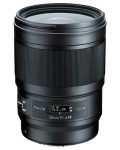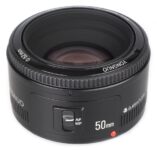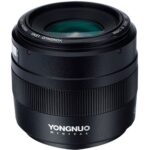Canon EF 50mm F/1L USM
Standard prime lens • Film era • Discontinued
- Announced:
- · March 1987
- Production status:
- ● Discontinued
- Country of design:
- · Japan
- Original name:
- · CANON LENS EF 50mm 1:1.0 L ULTRASONIC
- Class:
- · Ultra-fast full-frame standard prime lens
- · Professional model
- System:
- · Canon EOS (1987)
Abbreviations
| EF | The lens is designed for Canon EOS 35mm SLR cameras but can be also used on Canon EOS APS-C digital SLR cameras. |
| L | Professional lens with high quality optics and robust build. Meets the highest standards and provides excellent performance and flawless image quality unachievable with traditional optical technologies. |
| USM | The lens is equipped with Ultrasonic Motor. |
Specification
| Optical design: | |
| 35mm full frame | |
| 50mm | |
| F/1 | |
| 11 elements in 9 groups (Double Gauss derivative) | |
| 2 Bi-ASPH, 4 HR | |
| Floating element system | |
| Canon EF [44mm] | |
| 46.8° (35mm full frame) | |
| On Canon EOS APS-C [1.59x] cameras: | |
35mm equivalent focal length: | 79.5mm (in terms of field of view) |
35mm equivalent speed: | F/1.6 (in terms of depth of field) |
Diagonal angle of view: | 30.4° |
| Diaphragm mechanism: | |
Diaphragm type: | Automatic |
Aperture control: | None; the aperture is controlled from the camera |
| 8 (eight) | |
| Focusing: | |
| 0.60m | |
| 1:9.1 | |
Focusing modes: | Autofocus (AF), Manual focus (M) |
Autofocus motor: | Ring-type Ultrasonic Motor (*) |
Manual focus control: | Focusing ring |
Focus mode selector: | AF (FULL) - AF (LIMIT) - M |
Full-Time Manual Focus (FTM): | Yes |
Focusing distance range limiter: | 0.6m - INF / 1m - INF |
| Image Stabilizer (IS): | |
| - | |
| Physical characteristics: | |
| 985g | |
| ⌀91.5×81.5mm | |
| - | |
| - | |
| Accessories: | |
| Screw-type 72mm | |
| ES-79 - Snap-on round | |
| Not compatible |
Source of data
- Manufacturer's technical data.
Manufacturer description #1
The EF 50mm f/1.0L lens is the world's first f/1.0 lens for an SLR camera. The lens was developed to meet the needs of professional photographers, and features high optical performance at maximum aperture and high-contrast image quality. It was designed to meet the requirements of those who place much importance on image quality, brightness, and blur effect with full aperture photography.
Features:
- Low flare and high contrast despite the f/1.0 maximum aperture using two aspherical lenses.
- Floating element construction compensates for distance-sensitive aberration changes and provides quality images at all distances.
- Provides high performance by using glass with a high refractive index to correct curvature of field.
- Great color balance by using a new multi-layer coating developed exclusively for the high refractive index glass.
- The 50mm focal length and the ultra-large f/1.0 aperture give pleasant blur effects for objects not on the focal plane.
- USM (ultrasonic motor) provides quiet AF performance.
- Good manual focusing "feel" using electronic manual focusing ring.
Optical performance
(1) Flare elimination and curvature of field reduction
Because Gauss Type lenses have strong concave surfaces on both sides of the diaphragm, flare caused by peripheral refraction can be a problem with ultra-large aperture lenses such as an f/1.0. With the EF 50mm f/1.0L, refraction of concave surface is divided between both aspherical lenses, thus the luminous flux is refracted slightly, to eliminate the flare. The curvature of field generated by the weakening of the refraction of the concave surfaces is compensated by optimal arrangement of the high refraction glass elements. Also, good color balance is achieved with the EF 50mm f/1.0L using a multi-layer coating developed exclusively for use on high index glass.
(2) Floating mechanism
In a floating mechanism design, part of the focusing lenses remains fixed (or moves independently) during focusing, enabling the lens to compensate for aberration alterations with close-up shots and enabling good optical performance to be maintained throughout the entire shooting range. Although the aberration compensation operation differs depending on the lens, with ultra-large-aperture lenses such as the EF 50mm f/1.0L, high image quality is a must throughout the entire range (especially at close shooting distances).
In the EF 50mm f/1.0L the rearmost element, a positive meniscus, is stationary during focusing while the front ten elements move. The EF 50mm f/1.0L attains high image quality throughout the entire shooting range - from infinity to the closest shooting distance - by using this floating mechanism to compensate for curvature of field at close shooting distance and for spherical aberration alterations which are caused by the ultra-large-aperture of the lens at medium and close focusing distances.
Manufacturer description #2
An ultra-fast standard lens boasting the largest aperture of any SLR lens in the world. By using two large-diameter ground and polished glass aspherical lens elements and optimally distributing power in front of and behind the diaphragm, high-contrast, low-flare images are obtained even at maximum aperture. Curvature of field, which is a common problem with this type of lens construction, is minimized through precision use of high-refraction glass elements, and a newly-developed multi-layer coating for high-refraction glass ensures well-balanced colour reproduction. Changes in spherical aberration and curvature of field characteristics at close focusing distances - a common problem with ultra-large-aperture lenses - are minimized through use of floating lens element design. This super-fast standard lens opens up a whole new world of photo possibilites in shooting conditions considered difficult.
Manufacturer description #3
This standard lens boasted the largest aperture of any 35mm SLR camera lens when it went on sale. With two ground and polished aspherical elements and four high-index refractive glass lens elements, it delivered outstanding imaging performance with high contrast and minimal flare, even at the maximum aperture of f/1.0. The floating mechanism helped maintain high picture quality even at close focusing distances, while the electronic manual focus function allowed full-time manual focusing with a very light touch even in autofocus mode. This worked to enhance the already quick and rapid autofocus which employed a ring-type USM (Ultrasonic Motor) for the drive.
From the editor
One of the first lenses for the Canon EOS system. World’s fastest autofocus standard prime lens for 35mm full-frame SLR cameras. It was announced in 1987 but officially available for purchase only from September 1989. Such a unique optical design was made possible due to the relatively short flange focal distance and large diameter of Canon EF mount. The complex optical formula of the lens incorporates 2 large diameter ground and polished Bi-ASPH elements and 4 HR (high refractive index) elements for correction of spherical aberration and ultra-large maximum aperture. The lens was never popular due its steep price and contradictory optical performance. Canon had to discontinue it in 2000 due to the high production cost and low sales volume. Given the complexity of production of EF 50/1L USM, it seems like Canon decided to release it mainly to create more advertising opportunities for the newborn EOS system.
In 2007 Canon invented the EF 50mm F/1.2L USM lens with more simple and cost effective optical formula suitable for mass production. Computer-aided calculations allowed to create more compact design without reducing the optical performance.
The lens is not weather-sealed because lens designs based on all-group or front-group focusing are not very well suited for such form of protection.
Compared to other standard prime lenses in the Canon EOS system
- Fastest speed (F/1)
- Longest closest focusing distance (0.60m)
- Smallest magnification (1:9.1)
- Heaviest weight (985g)
- Longest length (81.5mm)
- Largest filter size (72mm), along with the Canon EF 50/1.2L USM
Other standard prime lenses in the Canon EOS system
| ■Canon EF mount (5) | |||||||||
| Canon EF 50mm F/1.8 • ⌀52 | 1987 ● | compare | 4 | 4 | |||||
| Canon EF 50mm F/1.8 II • ⌀52 | 1990 ● | compare | 4 | 4 | |||||
| Canon EF 50mm F/1.8 STM • ⌀49 | 2015 ● | compare | 6 | 2 | |||||
| Canon EF 50mm F/1.4 USM • ⌀58 | Pro | 1993 ● | compare | 5 | 2 | ||||
| Canon EF 50mm F/1.2L USM • ⌀72 | Pro | 2007 ● | compare | 5 | 1 | ||||
Lenses with similar focal length
| ■Canon EF mount (7) | |||||||||
| Sigma 50mm F/1.4 EX DG HSM • ⌀77 | Pro | 2008 ● | compare | 3 | 2 | ||||
| Sigma 50mm F/1.4 DG HSM | A • ⌀77 | Pro | 2014 ● | compare | 3 | 2 | ||||
| Tamron SP 45mm F/1.8 Di [VC] USD F013 • ⌀67 | 2015 ● | compare | 5 | 1 | |||||
| Tokina opera 50mm F/1.4 FF • ⌀72 | Pro | 2018 ● | compare | 4 | 2 | ||||
| Yongnuo 50mm F/1.8 EF • ⌀52 | 2014 ● | compare | 6 | 5 | |||||
| Yongnuo 50mm F/1.4 EF / F • ⌀58 | Pro | 2018 ● | compare | 4 | 4 | ||||
| Yongnuo 50mm F/1.8 EF II • ⌀58 | 2018 ● | compare | 6 | 5 | |||||
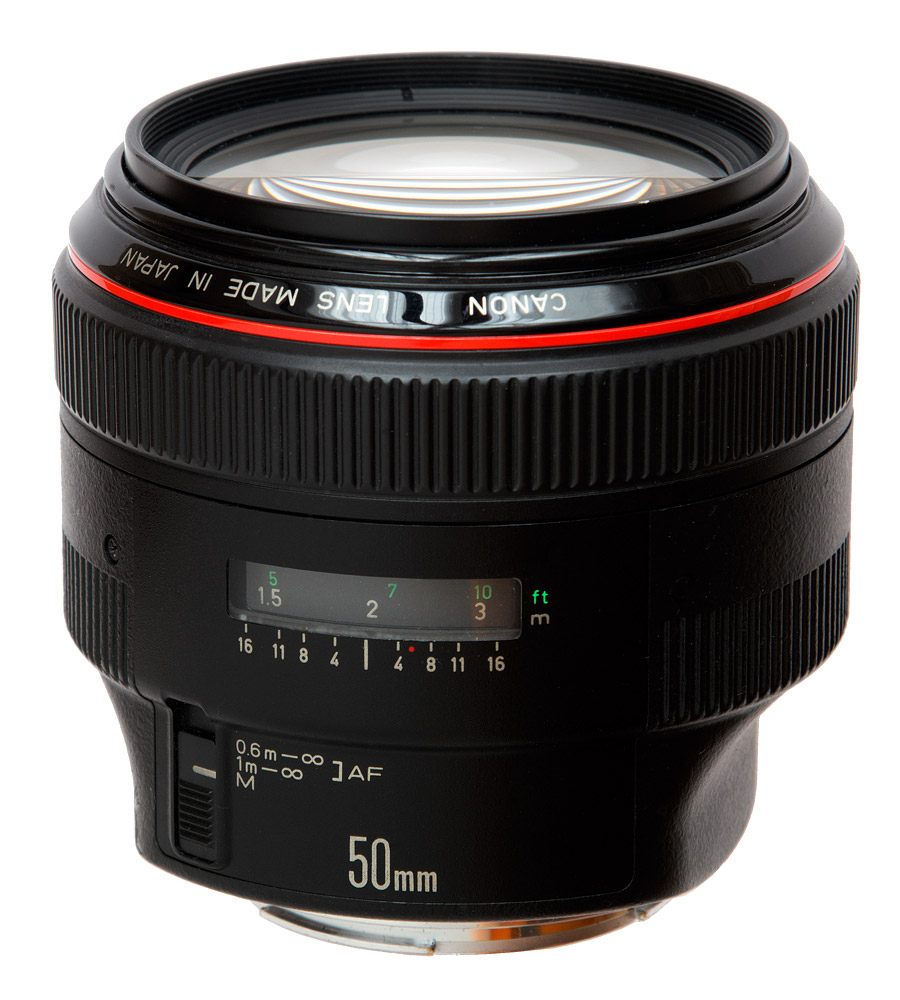
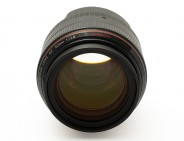
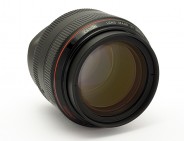
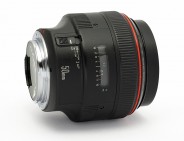
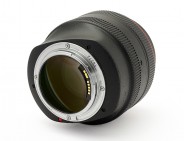
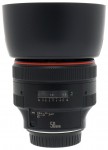
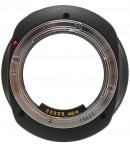
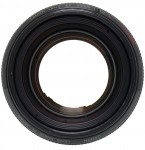
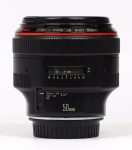
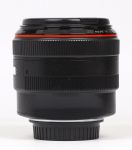
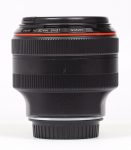
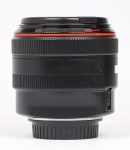
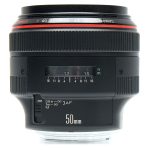
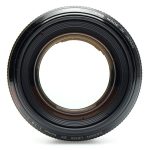
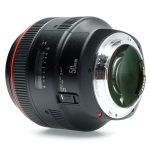
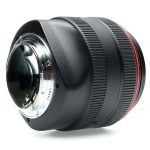
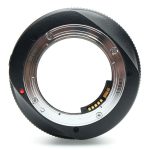
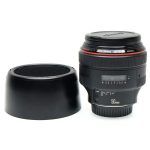


















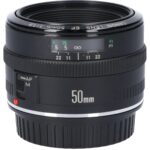
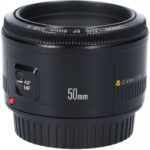
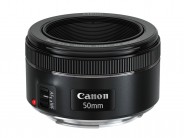
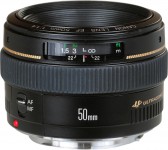
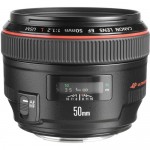
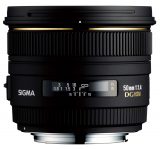
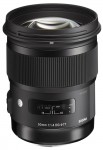
![Tamron SP 45mm F/1.8 Di [VC] USD F013](https://lens-db.com/wp-content/uploads/2015/09/1441200932000_1183050-150x150.jpg)
